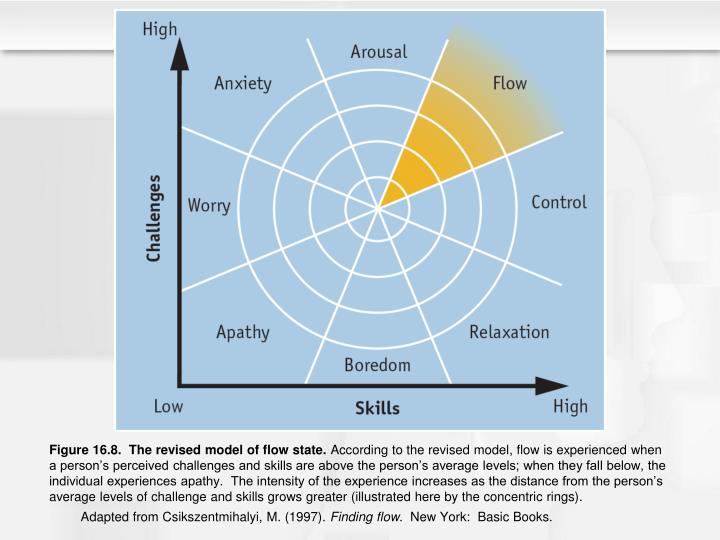

However, when one is in the flow state, they are completely engrossed with the one task at hand and, without making the conscious decision to do so, lose awareness of all other things: time, people, distractions, and even basic bodily needs. įor the most part (except for basic bodily feelings like hunger and pain, which are innate), people are able to decide what they want to focus their attention on. That is why when having a conversation one cannot focus as much attention on other things. Just decoding speech takes about 40-60 bits of information per second. According to Csikszentmihályi's 2004 TED talk, that number is about "110 bits of information per second." That may seem like a lot of information, but simple daily tasks take quite a lot of information. Psychologists have found that one's mind can attend to only a certain amount of information at a time. In any given moment, there is a great deal of information made available to each individual.

The cognitive science of flow has been studied under the rubric of effortless attention. Researchers interested in optimal experiences and emphasizing positive experiences, especially in places such as schools and the business world, also began studying the theory of flow at this time. Flow research became prevalent in the 1980s and 1990s, with Csikszentmihályi and his colleagues in Italy still at the forefront. The theory of flow came about when Csikszentmihályi tried to understand the phenomenon experienced by these artists. Artists, especially painters, got so immersed in their work that they would disregard their need for food, water and even sleep. Mihaly Csikszentmihályi and others began researching flow after Csikszentmihályi became fascinated by artists who would essentially get lost in their work. Etymologyįlow is so named because, during Csíkszentmihályi's 1975 interviews, several people described their "flow" experiences using the metaphor of a water current carrying them along: "'It was like floating,' 'I was carried on by the flow.'" 3. Just as with the conditions listed above, these conditions can be independent of one another. Feeling so engrossed in the experience, that other needs become negligible.Additionally, psychology writer Kendra Cherry has mentioned three other components that Csíkszentmihályi lists as being a part of the flow experience: Those aspects can appear independently of each other, but only in combination do they constitute a so-called flow experience. Experience of the activity as intrinsically rewarding, also referred to as autotelic experience.A distortion of temporal experience, as one's subjective experience of time is altered.A sense of personal control or agency over the situation or activity.A loss of reflective self-consciousness.Intense and focused concentration on the present moment.Jeanne Nakamura and Csíkszentmihályi identify the following six factors as encompassing an experience of flow: Hyperfocus is often mentioned "in the context of autism, schizophrenia, and attention deficit hyperactivity disorder- conditions that have consequences on attentional abilities." In some cases, hyperfocus can "capture" a person, perhaps causing them to appear unfocused or to start several projects, but complete few. Some examples include spending "too much" time playing video games or becoming pleasurably absorbed by one aspect of an assignment or task to the detriment of the overall assignment. However, hyperfocus is not always described in a positive light. The flow state shares many characteristics with hyperfocus. Named by the psychologist Mihály Csíkszentmihályi in 1975, the concept has been widely referred to across a variety of fields (and is particularly well recognized in occupational therapy), though the concept has been claimed to have existed for thousands of years under other names. In essence, flow is characterized by the complete absorption in what one does, and a resulting transformation in one's sense of time.
Flow state psychology full#
In positive psychology, a flow state, also known colloquially as being in the zone, is the mental state in which a person performing some activity is fully immersed in a feeling of energized focus, full involvement, and enjoyment in the process of the activity.


 0 kommentar(er)
0 kommentar(er)
